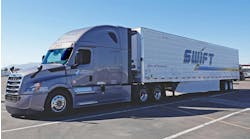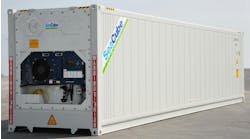Thermo King expert breaks down new refrigerant’s benefits
Thermo King recently adopted a new refrigerant for its truck and trailer transport refrigeration units (TRUs) it says boasts a lower global warming potential (GWP).
Using the new R452A refrigerant, in place of R404A, will help long-haul, middle-mile, and last-mile fleets reduce the carbon footprint of their TRUs by nearly 50%, according to Thermo King.
To better understand GWP, the difference between R452A and R404A, and how the switch impacts refrigerated fleets, Refrigerated Transporter recently turned to Chris Tanaka, Thermo King America’s vice president of product management, for his insight on the issue. Questions and answers are edited for space and clarity.
Refrigerated Transporter: At a basic level, how is R452A different from R404A, and what makes it more environmentally friendly?
Chris Tanaka: R452A is a non-ozone depleting HFO (hydrofluoroolefin)/HFC (hydrofluorocarbon) blend refrigerant that is safe and non-flammable.
The GWP of R404A is 3922; the GWP of R452A is 2140—nearly a 50% reduction.
RT: Why did Trane/Thermo King decide to lead the way and make this the standard going forward?
Tanaka: Thermo King is proactively making the change to help customers stay ahead of future regulation, and to help further advance Thermo King’s sustainability commitments and the sustainability commitments of our customers.
Sustainability is foundational to Trane Technologies/Thermo King’s strategy, and we are committed to delivering solutions that add value to our customers’ operations and are better for the planet.
Transitioning to a lower GWP refrigerant will help achieve Trane Technologies’ 2030 commitment of reducing carbon emissions by a gigaton, and it will support our customers’ sustainability commitments as well.
RT: This new refrigerant previously was used in select North American products. What were those products?
Tanaka: Previously, R452A was only offered/included on units being imported from EMEA (SLXi, E200, DRC).
RT: What is the value proposition for North American reefer fleets to make the switch? Is it only to get ahead of CARB standards? Any chance they receive incentives/credits for switching over?
Tanaka: Yes, the main value proposition for reefer fleets is to get ahead of CARB standards. CARB is requiring that all newly manufactured TRUs and domestic shipping container TRUs must use refrigerant with a GWP that is 2200 or less—effective January 2023.
There is no requirement to upgrade to R452A for existing units. Likewise, there are no direct incentives to do so. The deadline from CARB is really a manufacturers’ mandate for new equipment. The fleet obligation is to use equipment built with compliant refrigerants based on the manufacturing date.
Many fleets have their own greenhouse gas reduction goals and the refrigerant change can help. Fleets have responded to this opportunity in discussion, but they generally aren’t thinking about that connection.
RT: Is R404A backward compatible with existing Thermo King units, and what do you recommend as far as when fleets should start to transition? Anything maintenance departments must do differently?
Tanaka: Yes, it is compatible with some modifications. Since 2016, Thermo King has offered customers the option of using the lower-GWP refrigerant (R452A) as a drop-in solution for all truck and trailer units.
For a fleet to do this, they would have to fully reclaim the original R404A from the system and install an update kit, along with the new R452A refrigerant. It is not anticipated that there will be much demand for this, as there are no regulations requiring it. Therefore, fleets or individual customers can do this at their leisure.



